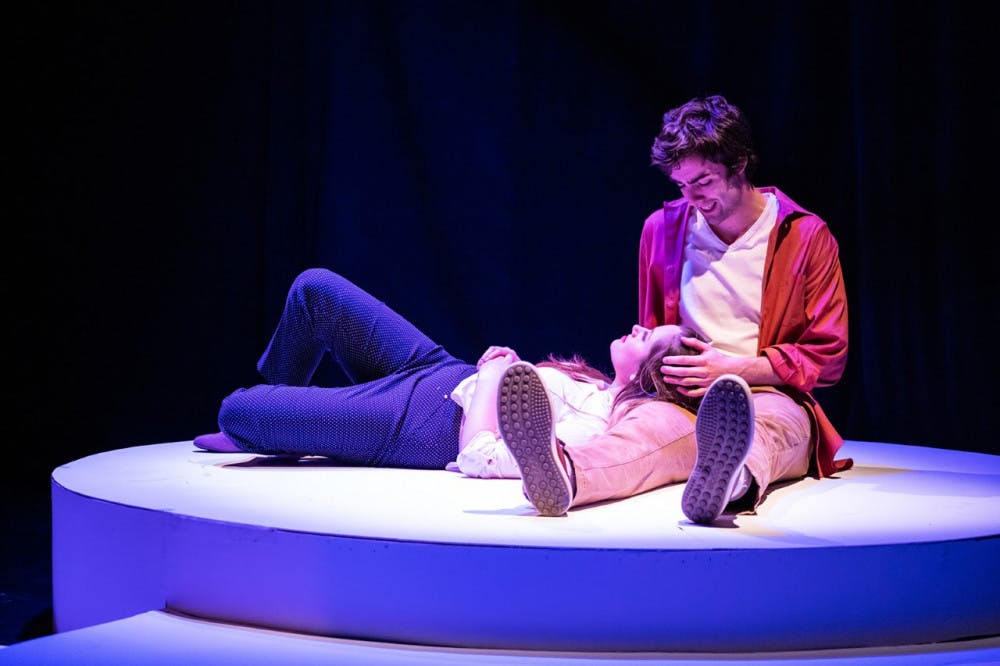“Constellations” is a good candidate to be the standard bearer of that contemporary idea in which science and passion dovetail, making an artist out of advanced theoretical astrophysics. This play, performed last weekend as Olivia Christie’s ’19 senior directing thesis, is based on a popular multiverse theory in which every possible world inspired by each variable actually exists, creating a series of parallel realities spanning every possible combination of choices ever possible (i.e. if you say yes today, there’s another you elsewhere that said no.)
Written by Nick Payne and originally performed in London in 2012 followed by a critically acclaimed 2015 New York performance, “Constellations” strings together a series of non-consecutive vignettes relating the possible relationship of Marianne (Madeline Ciocci ’20) and Roland (Will Koch ’21). In some instances, they fall in love … and then out of it again. Sometimes violently. In some, Roland never makes it past Marianne’s awkward introductory speech about immortality and licking one’s elbow, and in others she never hears his bee-anatomy themed marriage proposal. The story branches off like a tree, some possible plots growing only a few moments before ending, others stretching over several years and scenes. To describe it all here would be laborious and, I’m sure, unappreciated.
Suffice to say, the parallel-universe foundation breaks the need for typical narrative logic, allowing the play to fly across time, space and the multiverse, juxtaposing scenes and suspending information for as long as Payne decided. Thus, for example, we see Roland ask Marianne not to terminate her life early and to suffer her last few months with him while dying of brain cancer immediately before watching a surprise encounter between the two, both healthy, at a dance lesson, months or years after they’ve broken up. Such juxtaposition asks us what we’re doing with our little time in a new and intriguing way. It asks how we’re making our most trivial decisions. Those small decisions, we find, can lead to the biggest things in our lives.
It is a profound idea, at the base of the play, and it hit home … sometimes. It is hard to watch someone, even in fiction, struggle with terminal brain cancer. Harder yet, to do so without wondering about one’s own life and mortality. That was powerful. But much of the rest of the play was stilted, often by little things that prevented a more profound connection with the audience.
Most immediately jarring was the British accents. It was entirely unnecessary for the actors to force such an accent into their performance and, unfortunately, it was rather distracting. The accents alone made it much more difficult to connect with the characters and this play, more than most perhaps, relies on that.
That was only the chief of several anglophile references that, realistically, should have been altered. I recall a particular joke, something about living in Wiltshire versus Mile End, that I trust would have hit its mark with Payne’s original London-based audience but has little hope of doing so here in Middlebury.
Few, if any, of the members of the small audience walked out of Hepburn Zoo unmoved. It was an intriguing, challenging performance, well worth the experience of having gone.
Student-Directed ‘Constellations’ Explores a Relationship Through Parallel Universes

COURTESY PHOTO
Will Koch ’21 and Madeline Ciocci ’20 portray a bee-keeper and astrophysicist who meet over and over again in “Constellations,” a play by Nick Payne. Audiences watched hundred of possible meetings between the two in a play framed by a multiverse theory.
Will Koch ’21 and Madeline Ciocci ’20 portray a bee-keeper and astrophysicist who meet over and over again in “Constellations,” a play by Nick Payne. Audiences watched hundred of possible meetings between the two in a play framed by a multiverse theory.
Comments



